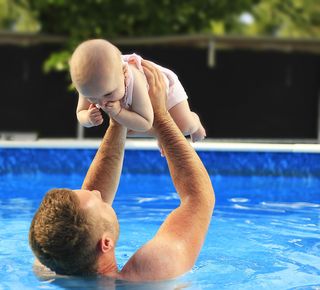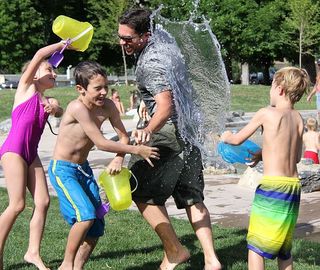Divorce
Saving Your Children from Becoming a Statistic of Divorce
Children’s greatest need in the throes of divorce.
Posted July 4, 2017

Numerous research studies confirm that children of divorce are prone to several physical, emotional, social, relational, and spiritual consequences as a result of their parent’s divorce.1 To name a few: poorer health, emotional problems, lower academic performance, increased danger of dropping out of school, difficulty in maintaining relationships, and retaining employment.The Divorce Study of over 10,000 children and parents who experienced divorce2 explains that quality relationships of parents with their children are the greatest antidote to the negative consequences from divorce.
Divorce typically drains parental psychological supplies and resources from children, perpetuating difficult life outcomes. When the family structure breaks, children turn elsewhere, often to peers and social media, leading some to embrace deviant and reckless actions in their search for understanding, support, and direction.3 To fill the void, they may act out for attention, pursuing solace through street gangs and substance and sexual abuse. Statistics confirm that children of divorce are more likely to be involved in crime and die at younger ages than children from intact homes, and they are also more prone to suicide.4
The Divorce Study informs that although 76% of children reported negative effects from their parents’ divorce, with 80% of parents recognizing that their divorce “negatively” affected their children; nonetheless, the quality of a strong parent: child bond differentiated children of divorce who said that they experienced “normal” development in childhood from those who described negative consequences of children of divorce.5 Children of divorce are not necessarily condemned to a future life of failure, deviation, or destruction. The good news is that the impact of divorce for children is within parent’s control.

The key element that most significantly affects children’s future is how parents of divorce care for children when experiencing divorce. How parents:
- listen to them
- nurture them
- engage them
- lead them, and
- love them particularly in the face of the challenges stirred during the divorce process.
Reading the Messages of Children
Parents can see for themselves whether or not they effectively communicate attuned and bonding messages with their children by observing their children’s responses:
I see you. You are important and invaluable; and you know it.
I love you and act in ways that show it.
I recognize you, take time to give you the attention you deserve, and we celebrate it.
I guide your discovery of your True Self that shapes your identity, dignity, and direction, and you embrace it.

Children of divorce learn quickly not to say what they feel or ask for what they need based on unspoken messages that they receive. They may feign a game face because they don’t want to be a greater burden for their parents who they see as struggling or because they feel their parents can’t really hear or understand their pain. Divorcing or divorced parents will find it especially helpful to their children, and for their bonds with their children, if they tune in and vigilantly respond by deepening their relationships with their children. Unless children's needs are met, they are more likely to become another statistic.
A Message to Parents in Divorce
Above all else, make an effort to recognize your children’s feelings and confusion. Your presence and attention confirm that you are still there for them, regardless of familial changes. The most confusing experience for kids is when they feel silenced; their greatest anxiety is when they are cast out into the world, alone. In your words and through your behavior assure them that this won’t happen. You know your children’s temperaments and personalities better than anyone. You need to retain your parenting role through the divorce and beyond—it was your implicit promise to your children when you brought them into this world. It is a priority and responsibility to make time to talk with your children about their concerns, fears, dreams, and wishes.

Rather than fearing that your children will be doomed because of your divorce, attend to the roots of distress that divorce ushers in for your children. Unaddressed negative feelings and thoughts with which children wrestle can be identified and addressed if they can trust in their relationship with you. The job in parenting is to support healthy development so that your children can confidently discover and pursue their trajectory. Through your active expressions of listening to them, nurturing them, engaging them, leading them, and loving them, you will provide your children with the tools that they need to develop soundly and master challenges constructively throughout their development.
John T. Chirban, Ph.D., Th.D., is a part-time lecturer at Harvard Medical School and author of Collateral Damage: Guiding and Protecting Your Child Through the Minefield of Divorce (HarperCollins, 2017). For more information visit drchirban.com.
References
1. Huurre, T., Junkkari, H.and Aro, H., 2006. “Long-term psychosocial effects of parental divorce.” European Archives of Psychiatry and Clinical Neuroscience 256: 256–263; DeGarmo, D. S. and Forgatch, M.S., 2005 “Early development of delinquency within divorced families: Evaluating a randomized preventative intervention trial.” Developmental Science 8, no.3: 230; https://divorcescience.org/for-students/interesting-divorce-research/no….
2. Chirban, J. T. 2017. Collateral Damage: Guiding and Protecting Your Children Through the Minefield of Divorce. New York: Harper Collins.
3. Anderson, J., 2014. The impact of family structure on the health of children: Effects of divorce https://www.ncbi.nlm.nih.gov › NCBI:PubMed Central (PMC); Fraley, R. C. and Heffernan, M. E., 2013. Attachment and parental divorce: A test of the diffusion and sensitive period hypotheses. Personality and Social Psychology Bulletin 39 (9), 1199-1213.
4. Velez, C. E. et al., “Protecting children from the consequences of divorce: a longitudinal study of the effects of parenting on children’s coping processes.” Child Development 82, no. 1 (2011): 245.
5. Chirban, J. T. 2017. Collateral Damage: Guiding and Protecting Your Children Through the Minefield of Divorce. New York: Harper Collins, 203-205.


